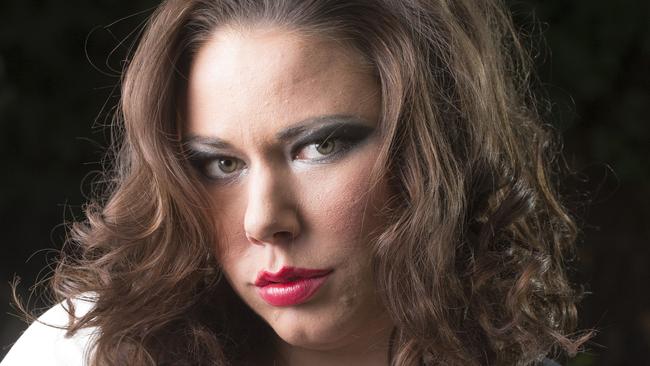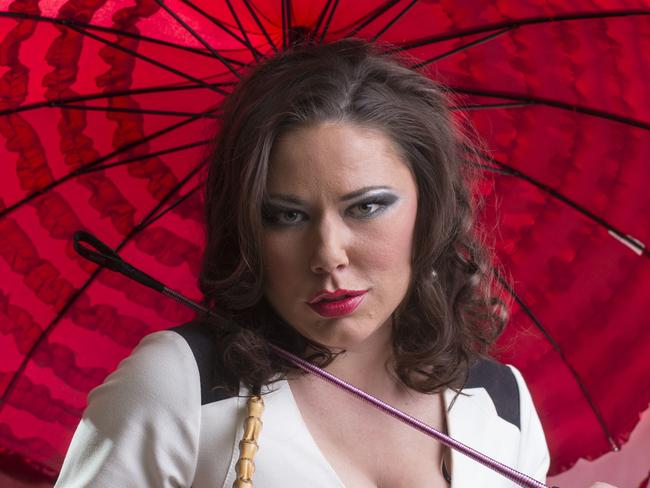Pippa O’Sullivan, better known as escort Grace Bellavue, has died aged 28
SHE was outspoken about what she did for a living, attracting thousands of followers in the process. Grace Bellavue was 28.

PIPPA O’Sullivan, the Adelaide sex worker who went by the name Grace Bellavue, has died after a long battle with mental illness.
The 28-year-old escort, writer and decriminalisation campaigner is believed to have taken her own life after posting a message on her Facebook page in the early hours of Monday morning.
The status update revealed a dark frame of mind and prompted an outpouring of concern from Pippa’s friends.
But the messages of support tragically fell on deaf ears and Pippa’s family has confirmed she passed away shortly after posting the status update.
“As you can see, Pip was dealing with issues that in the end overcame her,” mother Lyn O’Sullivan wrote.
Ms O’Sullivan told news.com.au she wanted her daughter to be remembered as “a free spirit” and a literary soul who “had an intimate conversation with life” through her unconventional line of work.
“She was the most literate person I knew and understood the human psyche like you would not believe,” Ms O’Sullivan said.
“We are going to look through some 30,000 social media posts, collate some of her writing and possibly publish a book.
Angel, the Bengalese rescue cat that had brought Pippa new joy in recent months, is being cared for by the family.
Friends, supporters and family left messages of grief and sorrow on Pippa’s Facebook page.
“Pippa was a rock to me in the hardest time of my life, when a lot of my friends couldn’t be bothered with my mess,” Erika Antoinette wrote.
Another Facebook friend wrote: “Why couldn’t someone or something of helped her! I’m just in shock and disbelief, I can’t believe my little cousin is gone.”

Pippa O’Sullivan was an outspoken advocate for the decriminalisation of sex work, which is illegal in South Australia, and took a stand against stigma surrounding the trade.
“Decriminalisation works,” she told the New Statesman in 2013.
“It allows sex work to be socially contextualised and regarded as a valid profession to be afforded the same human rights as workers in any other job.”
Pippa made headlines in 2013 when, as Grace Bellavue, she became the face of a new trend of escorts marketing themselves on Twitter.
Back then — before the account was hijacked — her Twitter bio read: “Nefarious escort, writer, miscreant and vagabond with a penchant for scotch and hip hop”.
She shared daily insights into her sometimes glamorous, sometimes difficult life and her passion for writing.
In a first-person piece published by Mamamia in 2012, Pippa wrote that she loved her job, and that she did it with “gratitude and amazement”.
“It is often the moment after sex, even with clients, that I relish the most,” she wrote.
“Once the chase is gone, we are just two human beings constantly fumbling our way within the world and it is then I begin to see the heart of masculinity which touches me most — the vulnerability.”
The New Statesman published an in-depth interview in 2013, which charted her early foray into the industry, working in a brothel from age 18. In 2011, she struck out on her own as an independent escort, working from an apartment and marketing herself online.
“The Twitter thing started as an experiment, but has since become her best weapon in advocating for the decriminalisation of sex work in Australia,” the New Statesman reported.
“We still have a lot of stigma, judgment and backbiting due to the nature of our profession,” Pippa is quoted as saying. “But social media has given sex workers a real opportunity to be heard.”

More recently, she revealed her struggle to work while battling mental health problems in a Facebook post on October 12.
“To all my regulars who have kept me in the black to survive and keep a roof over my head when I’m going through extreme burnout, I can’t express my appreciation,” Pippa wrote.
“I used to hate the white knight syndrome bulls***, but after burning out constantly and 12,000+ guys’ bulls*** physically, you turn into a snappy, violent, aggressive person and somewhere along the line you lose yourself.
“It isn’t the industry per say, it’s just accumulated PTSD and constantly guarding your back or screening ... I’ve had guns put to my head, yelled at too many people, removed people from clubhouses, been approached by lawyers from all sides of the fence, approached to run parlours, watched a lot of people slip and fall in a bath with the their throat slit.”
Pippa had been violently attacked by a former client, a paroled rapist, at an Adelaide apartment in 2012.
Her death came as a coalition of former sex workers launched a campaign for specialised mental health support catered to workers in the industry, and those who have left it, or want to do so.
Dozens of supporters have signed a letter to Beyond Blue and the Mental Health Council of Australia calling for tailored support, including the Coalition Against Trafficking in Women, feminist academic and lawyer Dr Jocelynne Scutt and singer Katie Noonan.
Former sex worker Simone Watson told news.com.au she suffered post-traumatic stress disorder, disassociation and self harm as a result of her time in the industry. She argued that sex workers had an elevated risk of mental health problems, due to their experiences of trauma at work.
“It’s not just a job like any other,” she said. “There are inherent health risks — like murder, and rape. There’s no other industry where that risk is higher.”
Ms Watson is the director of Normac, an organisation that is lobbying for the so-called Swedish model — which decriminalises sex workers, but criminalises their clients — to be implemented in Australia.
She said the need for mental health support should transcend the fraught politics of the criminalisation debate and was frank about her view of the industry.
“It isn’t the stigma that kills people in the sex industry — it’s the horrors of the job,” Ms Watson said.
“You earn thousands and thousands of dollars each week, and it disappears on just surviving the life.”
She said research showed female sex workers had poorer mental health than Australian women of comparable age who were not in the industry, and that many sex workers were suffering from PTSD.
Former sex worker Geena Leigh said she spent almost two decades working in brothels, private apartments, massage parlours, escort agencies and on the streets, repeatedly going back to the industry because she “felt trapped”.
“It was fear that kept drawing me back,” Ms Leigh said.
“Fear of not having enough money, fear of not fitting in to the real world, fear of someone finding out. I was mentally imprisoned for 19 years.”
Ms Watson said mental health support was crucial to saving the lives of women who wanted to leave the industry, as well as those who wanted to stay.
The peak body for sex workers, the Scarlet Alliance chief executive Janelle Fawkes said: “Sex workers in Australia experience unacceptably high levels of stigma and discrimination and in some states criminalisation. Both public attitudes and policy approaches that harm sex workers are fuelled by those that refuse to acknowledge sex work as legitimate employment.
“As sex workers we deal regularly with individuals and groups that blatantly lie about our experiences to suit their own agenda.” Ms Fawkes said.
If you or someone you know needs help, contact Lifeline Australia on 13 11 14.




